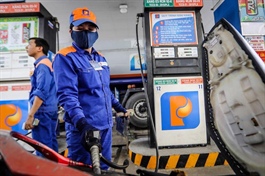Fuel shortages looming this quarter for importers
Fuel shortages looming this quarter for importers
The domestic petroleum market could experience a critical shortage in the forthcoming quarter owing to inequality in product import ratio among local importers and limited supply sources.

The Ministry of Industry and Trade (MoIT) convened an urgent meeting on February 9 in order to ensure a “stable supply source in all contingencies”.
Tran Duy Dong, director general of the Department for Domestic Markets under the MoIT, raised a warning that fuel supply might be constrained from March with abated inventories compared to the average level in previous months.
In February, supply is matching demand approximating 1.8-2 million cubic metres of petroleum of all types per month.
Distress in the petroleum supply market has become increasingly apparent. Financial constraints have forced the Nghi Son refinery and petrochemical mega complex to curtail oil refining volumes. Retailers’ speculation and inequality in petroleum products’ import ratio among local importers have overshadowed Vietnam’s economic picture.
The crude oil price in the global market has increased twice since early January and remains unpredictable.
Figures by the General Statistics Office show that the petroleum price in the domestic market is increasing proportionally with fuel prices in the global market, constituting a 0.19 per cent hike in the consumer price index (CPI) in January against December 2021.
January’s CPI was up 1.94 per cent compared to one year ago, while the core inflation picked up 0.66 per cent. These indexes have put significant pressures on the price of commodities, and particularly those using fuel as input material for production.
The domestic petroleum market is connected to the global market. Each year, the country still needs to import nearly 30 per cent of its petroleum, mainly from Malaysia, South Korea, Singapore, and Thailand. Figures by the General Department of Vietnam Customs showed that last year Vietnam imported 6.96 million tonnes of petroleum products, down 15.5 per cent on-year.
The petroleum import price fetched around $593 per tonne, a jump of $191 per tonne compared to one year ago, driving up the total amount put into import to more than $4.1 billion.
More costly petrol prices in the global market have brought Vietnam multiple disadvantages. Figures from the Ministry of Planning and Investment showed that Vietnam mined 11.47 million tonnes of crude oil in 2020. This figure was shed to 10.23 million tonnes in 2021, and is expected to further pull down to 8.74 million tonnes this year.
By contrast, the local demand for fuel saw a steady rise from 11.948 million tonnes in 2020, reaching 13.71 million tonnes in 2021 and could touch 14.18 million tonnes this year.
MoIT Deputy Minister Do Thang Hai conceived of a worst-case scenario of Nghi Son postponing production, forcing petroleum traders to scale up imports to offset the shortfall.
“Nghi Son’s dwindled capacity from early January has affected supply sources,” Hai asserted.
Usually, the supply from Nghi Son and also Dung Quat Refinery satisfies about 75 per cent of local demand for petroleum products, and the remaining 25 per cent is offset by imports.
The MoIT has spared no effort to ensure that uncertainties in petroleum supply would not dampen Vietnam’s ceaseless efforts for an economic rebound. In fact, albeit being deemed as a strategic staple in Vietnam, the country’s total petrol reserves remain quite low at about 20 days minimally, much too small compared to the actual demands of the economy.
Meanwhile, capacity augmentation from other petrol plants proves unfeasible. Data from Vietnam Oil and Gas Group showed that this January, Dung Quat had reached 103 per cent of its refining capacity against its maximum of 108 per cent.
The Vietnam Petroleum Association currently consists of more than 40 member units who partake in petroleum imports, representing 85 per cent of petroleum products in circulation in Vietnam. Association chairman Bui Ngoc Bao admitted that the inequality in the petroleum import ratio among member units might cast a dent on import plans to offset for the shortfall in domestic production.
“Smaller firms find it hard to approach supply, meanwhile several major ones like Petrolimex or Vietnam Oil Corporation (PVOil) face no hurdles in the import business,” Bao said.
Petrolimex has inked petroleum import contracts, while PVOil has worked on additional import plans, with an estimated 26,000 cubic metres of petrol and 42,000cu.m of oil to be landed in Vietnam ports on February 20.
“But how the situation may be this upcoming May remains opaque now,” Bao noted.























